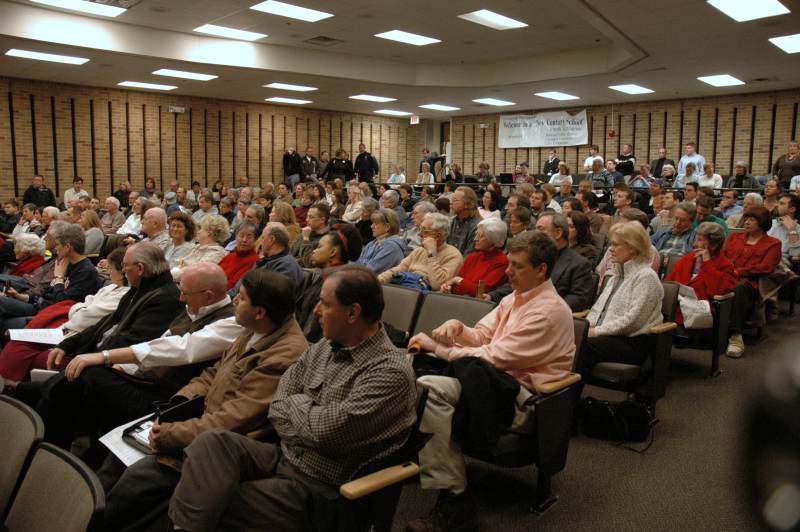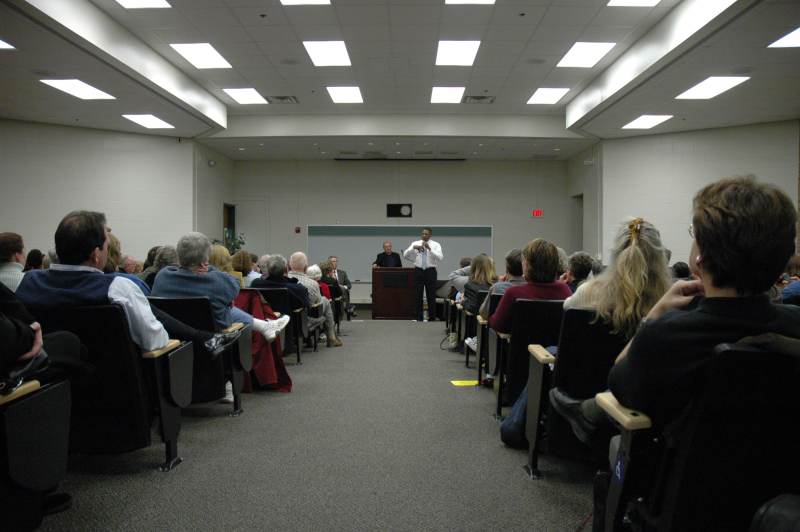
|
Broad Ripple Random Ripplings

The news from Broad Ripple
Brought to you by The Broad Ripple Gazette
(Delivering the news since 2004, every two weeks)

|
| Brought to you by: |

|

|

|

|

|

|
Converted from paper version of the Broad Ripple Gazette (v03n05)
Town Hall Meeting Unites Residents with City Hall
posted: Mar. 10, 2006
A town hall meeting was held at Broad Ripple High School in the mini-auditorium. More than 200 people packed the room, and some attendees were turned away at the door. I have to admit that when I first heard that the Broad Ripple Village Association (BRVA) scheduled a town hall meeting, I was a little worried. With the neighborhood controversy and the anger that residents have expressed to me, I expected an angry mob with flaming torches - like the end of the movie Frankenstein. I was relieved when I saw how orderly everyone was. The residents had good questions and the city officials had good, although mostly only "official response", answers.
The evening was moderated by NUVO's David Hoppe. Attendees (mostly) raised their hands to ask questions and were limited to three minutes per person. The panel answering included Katrina Thielman from Smoke Free Indy (Psst! Katrina, remember that you get free food at Yat's during Lent! See page 24), mayor's neighborhood liaison Rachel (O'Neil) Buckmaster, administrator for neighborhood services Kevin Sifferlen, deputy mayor Steve Campbell, director of the Department of Metropolitan Development (DMD) Maury Plambeck, and attorney and chairman of the Greenways committee Greg Silver, Two members of the City-County Council (CCC) were in the audience - Joanne Sanders, councillor at large, and council president Monroe Gray. Many times during the evening audience members noted that Jim Bradford, the councillor representing Broad Ripple in district 3, did not attend.
"I'd like to talk about zoning," said a resident at the back of the room. A round of applause swept over the room. "Broad Ripple is a lot of things to a lot of people. To me it's home, it's my neighborhood. The qualities that make Broad Ripple worth living in are peace and quiet, beautiful tree-lined streets, and its quaint homes. The point I would like to make if I could talk to a developer face-to-face is that if you continue on this path that you've been set on for the past few years, you're going to destroy the very thing that makes Broad Ripple desirable to live in." This triggered another large round of applause. "What exactly happened between the first denial and the second approval [of the Winthrop petition]?"
Maury Plambeck answered, "I can't tell you what happened, but I can tell you the process." The director read the Indiana code that the DMD must follow when hearing proposed rezoning petitions (see inset box). "Staff is the first group that looks at [a petition], and it's a consensus, its not one person, even though one person makes the recommendation at the hearing. It's all of the planners. The reason we do that is because as you all know, reasonable people [can] disagree on things - even people in planning disagree on how these five things [in the code] might get impacted when we hear a rezoning [case]." He further explained the process. The staff report goes to the hearing examiner. The examiner's ruling can be appealed since it is a ruling from one person. Appeals are heard by the Metropolitan Development Commission (MDC) where it takes a majority vote from the nine members to overturn the hearing examiner's ruling. If the MDC approves a previously denied petition, then the City-County Council must approve the rezoning, since rezoning is a change of the law.
Director of the Department of Metropolitan Development Maury Plambeck answered zoning questions raised by the audience at the town hall meeting.

Due to the magnitude of rezonings that come before the CCC, most are not called down for a hearing, although the council has the right to hear any case. That right is exercised rarely - usually for controversial cases. It takes 16 votes to call down a case. Before the full council hears the case, the petitioners meet with the remonstrators to attempt to work out a compromise. If no compromise is possible, the council hears the arguments and votes to overturn the MDC ruling, requiring 18 "yes" votes to pass.
The law states that neither the hearing examiner nor the MDC can be contacted, in an attempt to change opinions, by anyone - petitioner, remonstrator, or city employee. The council can be contacted (lobbied).
Attorney Greg Silver made a statement concerning the Winthrop case. "The greenways commission was not involved, whether that was right or wrong, the developer did not come to us and talk to us about what they are proposing. I looked at the master plan for the greenways, that is part of the comprehensive plan, and realized that the master plan and the Monon has been violated by this case. I am going to intervene in this case to get those 18 votes [to overturn the MDC ruling]. This case is wrong. It is too close to the monon, it's going to destroy 61 trees, and many of them along the Monon."
David Hoppe gave the floor to an audience member near the back of the hall. "My name is Todd DeGroff. I'm the attorney for the Driftwood Hills homeowners association. We filed a lawsuit against City-County Council and Metropolitan Development Commission. I was interested to hear the description of the state law that involves rezoning petitions, because that law was literally never mentioned in the case that involves Nora and Driftwood Hills. We went through the three-step procedure that was mentioned, where the hearing examiner heard the case, then it went to the Metropolitan Development Commission and then the City-County Council rubber stamped those decisions. The hearing examiner not only never considered the state law that was just mentioned, she actually asked a member of the public, a member of the audience, for a copy of law during the hearing. A person came forward and had a copy. The Metropolitan Development Commission never mentioned the law, the mandatory law, the five steps. Then the City-County Council, you folks were luckier than we, your case was called down for a contested hearing, refused to call our case for a contested hearing - forced us to court. Now we are challenging the legality of the entire process. We believe the law was violated. For goodness sake, we have these laws, I have to follow the law, its not optional with me. We've got them, let's follow them. In the first 10 months of 2005 [the MDC] approved over 90% of the cases."
There was a question for the panel about the MDC meeting place and time. It was stated that Carmel and Zionsville hold their meetings at night. This would allow more input from residents. To attend an Indianapolis MDC meeting, residents have to take off work and drive downtown for the 1 P.M. hearing, sometimes waiting several hours until the petition of interest is heard. Maury Plambeck replied that a survey was given to the members of the MDC boards and the response was that none of those people would serve if the hearings were held at night. This elicited a burst of applause. He also said that the hearings are often long - lasting five or six hours. A 7 P.M. start time could result in a hearing running past midnight. The meeting schedule is in the bylaws of the MDC. To change the schedule, each MDC board would have to vote on the change.
A question was raised on how people are appointed to the MDC boards. "For the Metropolitan Development Commission there are nine members," replied Maury. "Four are appointed by the mayor, three are appointed by the City-County Council, and two are appointed by the county commissioners. They are all appointed for a one-year term. On the boards of zoning appeals there are five members on each. Two are appointed by the mayor, two are appointed by the City-County Council, and one is appointed by the Metropolitan Development Commission. They are all volunteers."
An attendee asked if there are any environmentalists on any of the boards. The panel did not know. Maury said that there is no requirement in Indiana for members to to have specific areas of expertise, although some other states do have requirements. A member of the audience stated that the boards have many members that are developers.
Audience member Bob Marks was recognized. "You've had a plan in place since 1995. The businesses here and the residents here have invested in what they are doing here based on what they saw in the plan. You can't change the rules this monumentally in the middle of the game for the people that have already invested [in Broad Ripple]." He said that there was a similar situation in Zionsville, when he served on the planning commission there. Zionsville decided to place a moratorium on development until the plan for Zionsville could be reviewed. "If we are all going to sit down and play a game, we all have to know what the rules are and we all have to play by the rules. Otherwise anyone with a fat pocket is going to come along any neighborhood street, anybody they can talk into selling two or three places, they are going to throw in 25 or 30 condos. We need to stop it right now."
Audience member Bob Ryan stated that when he tried to get a zoning variance to turn the upper floor of one of his houses at 66th and Ferguson Street (across the street from one of the recent condo proposals that was passed by the MDC) into a third apartment unit, it was rejected because of the density.
BRVA president Ellen Morley Matthews explained the failed arbitration step that recently occurred. "We believe that the proposal that we put forth is reasonable. We don't expect the petitioner to develop anything for free. They are in business to make money and anyone who owns a business is entitled to a fair margin. Our proposal to the petitioners, rather than 29 units on a acre of earth and the destruction of every tree on that earth, which is a sound bite from the petitioner, we proposed 8 to 10 [units]. Something that would blend in with the neighborhood and be beneficial to our community. The petitioners were not interested in this proposal."
BRVA president Ellen Morley Matthews explained the status of current zoning issues.

The issue of property taxes was raised. In each of the recent zoning cases the petitioner stated the tremendous increase in property taxes that the city would receive from the proposed condo developments. Maury replied, "Taxes should not be used to make a decision for a zoning case. Because there are places that the comprehensive plan says you can do that kind of project." The taxes generated would be the same if developed in a place where appropriate.
Ellen Morley Matthews adjourned the meeting at 9 P.M., thanking Peter Dean for organizing the event and all of the people from the city that came to answer questions. Ellen said that the BRVA will try to have several meetings like this one throughout the year.
NUVO's David Hoppe (behind the podium) listens as the panel responds to questions from the audience.

Broad Ripple resident Leona Glazebrooks expressed her concerns about development.

Deputy Mayor Steve Campbell answered many questions at the town hall meeting.

alan@broadripplegazette.com

|

|

|
| Brought to you by: |

|

|

|
| Brought to you by: |

|

|

|
















